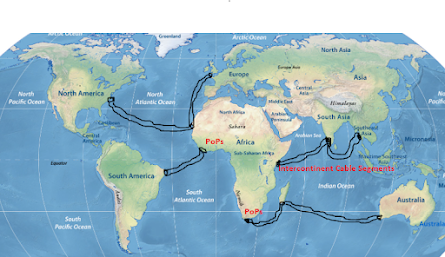Lessons from Alibaba and Amazon, creating markets and a digital economy in Africa by 2025
Alibaba is an e-commerce and internet company based in China with 2019 revenues totaling USD 72 billion. Amazon, another company based in the USA and it generated USD 280 billion in the same period.
By comparison, the total tax revenue collected by the Uganda, Kenya and Tanzania economies over the last year was a combined USD23.8bn. South Africa, one of the biggest economies in Africa collected USD73.8bn in tax revenues over the last year.
These numbers therefore tell us a very interesting story; that to get Africa out of poverty, increase employment opportunities and improve the well-being of citizens, African governments must strategise and invest smartly to create an enabling environment for new and disruptive business models that fully embrace the power of ICT to boost trade both in-country and with other countries in Africa. With a population of about 1.3bn people, and a median age of 19.7 years, Africa needs to imagine and create new and scalable employment avenues for the young population which in turn boosts economic growth. We must envisage and implement an Africa-wide e-trading platform, one that connects SMEs, farmers, industrialists, entrepreneurs and Government platforms across Geographies, as depicted in a futuristic Africa map below.
And Here is how....
1) Enabling Laws and Legislation
Under the Africa Free trade Area(AfCFTA) initiative, Africa must rethink and focus resources on enacting, and implementing laws that promote investment in ICT and enabling Technology. This is crucial in unlocking long-term capital from development partners and private investors, since it would result in the creation of favorable tax regimes, removal of tariff and non-tariff barriers, inclusive data protection and privacy laws, investment waivers where necessary and so on.
2) Digital Identity Evolution
In order to foster an environment that promotes e-trade, every government must undergo a transformative digital life cycle for its population, services and business registration processes, using technologies and protocols that support the trust and authentication frameworks needed to realize e-commerce models. This will facilitate and allow for secure, traceable online transactions to take place. Furthermore, an implementation scheme that tags identity to geographical locations and nature of business is crucial in tax reconciliation and will facilitate the widening of the tax base in the respective countries.
3) Common Virtual currency (West Africa, East Africa, Southern Africa, Northern Africa)
Mobile money or digital financial services have grown in leaps and bounds especially, in Sub-Saharan Africa. Its maturity in most transaction types - P2P transfers, Merchant,Bulk payments, remittances etc means that we can adopt this as virtual currency to fast track the e-trading platform implementations. Just to show its vibrancy, MTN, one of the biggest network Operators in Africa reported in its Group report transactions to the tune of USD 96.1bn over its mobile money platforms across Africa in the last year(2019). these transactions are probably mainly in-country transactions but It would therefore be interesting to look at the percentage of inter country transactions and how this can be scaled across Africa.
Other Enablers....
4) Investment in Power and Energy
According to a recent World Bank report, the electrification access rate in Sub-Saharan Africa is at 43% and this is still low compared to the global access rate(87%) . Electricity is needed to power manufacturing and Agricultural value addition industries. Luckily as a continent, we are blessed with massive green energy potential; think Hydro, Solar and Wind Power. To harness this however comes with huge CAPEX investment outlays, and therefore access to affordable, long-term capital becomes very crucial. There has been increased investment in this sector, especially in hydro power generation, with examples of grand power projects happening today in Ethiopia (GIRD) via local capital mobilization (USD 4bn via bonds to citizens & USD 1bn Govt) and in Uganda (Bujagali, Karuma, Isimba) via Development partners. Several other generation projects, under the World Banks' Scaling solar initiative are happening in Senegal, in Zambia to address the MegaWatt capacity gap on the continent. There is however a big deficit in distribution networks that get power to the consumers. In general, investments in generation, distribution, and smart grid metering solutions need to be increased, possibly through public private partnerships to fast track access to energy for industry and other sectors.
5) Data Centers, Fiber infrastructure and Rural Network Coverage
A virtual e-trading platform requires other baseline platforms that ensure secure connectivity, internet access and a repository for financial and other collected data. Private operators( Mobile and fixed network operators) have done investments in this space across the continent. With the Smart Africa Project initiative however, 24 African governments are also working with development partners to invest in 24 Tier 3 & Tier 4 Data centers, and thousands of Kilometers of cross border fiber connectivity to support the cloud economics agenda, which is a great step in the right direction.
Still however, the level of broadband access and internet penetration that is important in getting subscribers online, especially in rural areas is low, with about 300m people in sub-saharan Africa without access, according to 2019 GSMA data. This is largely due to low ARPU levels that are unattractive to private network operators. Smart, green, cost effective infrastructure solutions can address this in an innovative manner that balances deployment cost and short -midterm revenue expectations.
6) Investment in FMCGs & Manufacturing industry
Africa is largely a continent whose economy revolves around agriculture. With improved agricultural practices is an upsurge in agricultural productivity which must be accompanied by increased investment in industries, to reduce raw material export, and focus on value addition to increase revenue margins. The e-market place obviously offers extra revenue through multiple transaction fees.
Increased access to Electricity also means other manufacturing sectors are able to thrive efficiently with a ready e-market platform.
7) Digital ICT Skills development
In this digital era, Africa governments must re-align the education systems, with major focus on creating a workforce for the 21st century armed with digital skills in diverse information technology areas e.g databases, web and Applications development, information security and so on.
In conclusion, Africa has a great opportunity to increase its GDP and population livelihood through new digital business models. However, the critical enablers of digital identity, supporting laws and regulations, e-finance solutions as well as basic infrastructure must systematically be addressed.




Comments
Post a Comment